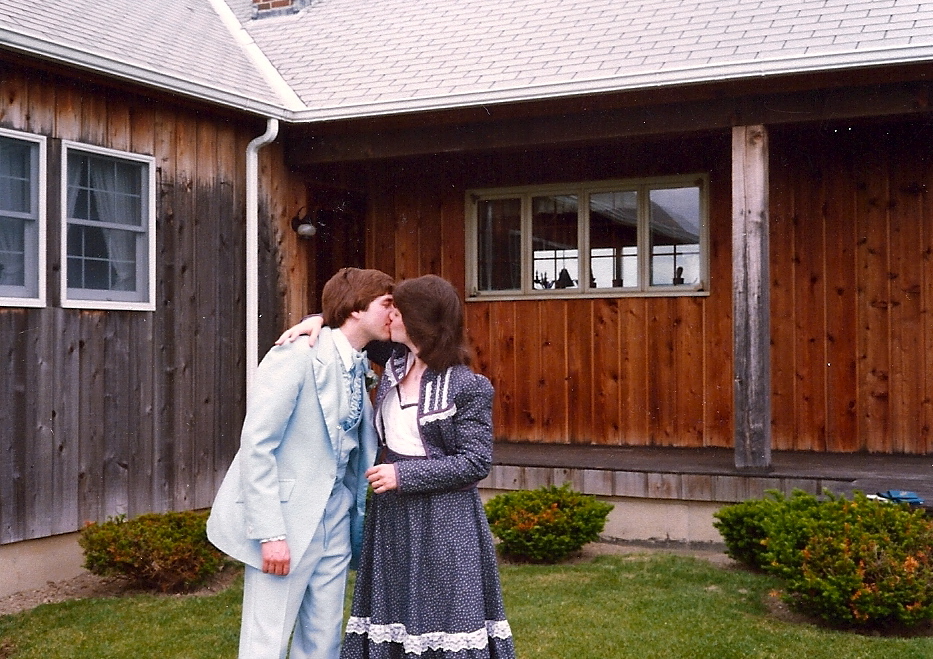The film “The Amish” has triggered some new thoughts on the subject for me. For instance, Karen Johnson-Weiner said about the Amish “theirs is a lived faith.” That idea of a lived faith really intrigued me. And then I started thinking about the relationship that the Amish have to Jesus and I think that I may have discovered the fundamental difference between the Amish and the born-again believers. Though the Amish recognize Jesus as the son of God, who came to earth so that we may find everlasting life, it is Jesus on earth or Jesus as human with whom they identify. They strive to follow Jesus’ example and live their lives as Jesus lived his life on earth. Even to the point that they see Jesus as a martyr, they follow his example. So it seems there is no separation between the Amish culture and their religion, or what they believe from the way they live. Suzanne Woods Fisher, host of Amish Wisdom, has an Amish proverb posted on her blog: “Faith and works are the candle and its light — they cannot be separated.” In a world in which people often find their lives fragmented and disconnected from some greater meaning, it seems that the Amish have the answers many people are searching for.
I recently heard Mark Samels, Executive Producer of American Experience, being interviewed by Scott Lamar on Smart Talk, in which he articulated his feelings about Amish life. He said that one day he stood by a road in Pennsylvania, watching an Amish man plowing his field with a team of horses, while across the road his wife and kids were hanging up laundry on a spring day and the wind was blowing. He said, “I fell into this sort of reverie in a way.” He asked himself, “Could I simplify my life — get rid of all my stuff and get a little bit more attached to something more meaningful and be closer to my family?” He said he realized how we cannot have it all and that we make choices in our lives. He had to ask himself, “Would I be happy to only be educated to the eighth grade? Would I be happy not being able to travel the world like I’ve been able to do? Would I be happy then? You realize, you make choices in life. The Amish have made a really profound choice. Sometimes it looks really appealing and sometimes I’m glad that I can just watch them.”
First of all, these are my sentiments exactly and I grew up Amish and chose to leave. There are times when I imagine what my life would be like if I had stayed Amish and married someone in the community. Maybe I would have a dozen children. By now, most of them would most likely be married with children of their own, making me a grandmother many times over. I would be entering that time in my life when there isn’t a heap of work to be done every day and I could go visit with my grown children or get together with other women for a quilting. My life would be predictable and cyclical. Every two weeks I would go to church. Every spring and fall, I would go to Ordungs Church and then two weeks later to Communion Service. I would be attending many weddings throughout the spring, summer, and fall and funerals throughout the year. The Amish are steeped in tradition and their patterns of life are unchanging.
When I compare this to what my life actually is, I realize Mark Samels has hit on something profound with his few words about how we make choices in life and we cannot have it all. I was able to marry the love of my life. We have two healthy grown sons. I had the opportunity to acquire a Smith College education, which included an internship with Dr. Donald Kraybill and studying abroad in Hamburg, Germany for a semester. And I wrote a book about my life. So much of this could not have happened had I stayed in my Amish community. Nor would I have the freedom in my everyday life that I do — I love going biking with David and driving to book talks in our own vehicle. I don’t have to stay with the stable and predictable life I would be living as an Amish person — I get to be adventurous and satisfy my “Wanderlust.”
 |
| David and me on our wedding day, just before leaving on our honeymoon |
Someone asked me at a recent book talk how I filled the void in my life that the loss of the Amish community created. My answer was, “I didn’t. It was a tradeoff. There are things I lost and other things I gained from leaving my Amish community.” The losses I endure can sometimes be painful, yet my Amish training has allowed me to accept this.
The messages we are bombarded with in the mainstream culture is that we can have it all — we can stay young; we can avoid pain; we can buy happiness or contentment — in other words, we can buy anything we want. However, the Amish represent something money cannot buy. From their martyred past and and their deliberate choice to make hard work a part of their lives, they show us that being human means we do get sick and feel pain; we do get old; and that suffering and death are part of being human. They believe that this is what Jesus exemplified by dying on the cross.
So in a culture in which we are often out of touch with the human condition, the Amish represent the alternative.
 |
| A very sad day — driving behind Mem’s funeral procession. |



Fabulous blog post Saloma!
I think you hit some very true and valid points. I think that it is the traditions that intrigue Englishers. However these such traditions or rituals could be put into place in anyone’s life.
I am so happy that you are living “your” happy life, you deserve it. I think every person should be given the choice of the path they choose. Not that parents can’t help to keep it on a good path.
Thanks for sharing these interesting insights. In many ways I can relate to what you say about the Amish, even though the Hutterites are very different from them.
You really know how to put things in perspective. Some of your comments just leave me in awe, so right on. Vicki
Of course, the trick is to realise that we have these choices to make. What you describe in this post is how we all make choices without even noticing it, because not all choices are as obvious as (say) deciding what to eat for dinner.
Every day, we make a choice to continue living the way we do. It doesn’t feel like a choice because we aren’t aware of it…it just happens.
Mark Samels reached a profound realisation – that his way of life was a trade-off compared with other possibilities, and he was happy with what he had. But I bet he’d never be able to point to when he consciously chose his way of life over any one of the alternative possibilities. It just turned out that way.
I can’t really know what it is to be Amish as I have never been.But,from what I have learned of their way…I admire them so much. That they have forsaken and separated themselves from the way of the world,clinging to tradition and simplicity in serving God…I see that way as a great testimony and witness to a world that has so far removed itself from Godliness,from “community” and even the sound tradition of “Family” . I consider them brothers and sisters in the Lord,although they may consider me an outsider. My question is…Are they not considered “Born again”Christians if they believe Jesus to be the risen son of God and Savior of the world? And do they regard everyone outside the Amish faith ..unsaved? I do not believe in “Once saved,always saved”as I believe we can remove ourselves from God’s grace when we willfully sin against him. He does not leave us but,we leave him when allowing our sinful nature to come before him by turning back to the way of the world,the old man,the old sinful nature. We are all freewill agents as God planned it so.He wants us to love him and serve him by our choice… not his. I would love the privileged to be among the Amish for awhile..to live as do,to worship as do…I do believe to be a child of God is to be free of our sinful nature by excepting Christ as our redeemer,to truly love as Christ does,unconditionally,without judging.
I am sorry for going on as I have…I guess,I am full questions :) I would love a response from you if you care too…My email address is shelleymb47@aol.com….thank you for your blog and this post…I always enjoy visiting you….blessings
We don’t change people nor cultures to fit around us. We choose to abide by their rules and ways of living, instead of trying to change them. If we try to change them we are asking for a power struggle. We lock horns and we fight. But usually the one wanting the power leaves in disgrace, so why fight. It is wise and better to quietly leave and be and do what you want to do. This is for plain ordinary people. If the fighter is a preacher with influence and power, you also leave and take half of the crowd with you. I was in a situation like this a number of years ago. I went with the movement. Then I moved out of the new movement. Then the leader fell over dead and the community he so much wanted to perfect went to nothing.
I have many times said that the biggest lie of our society is that we can have it all. Once I realized that this is indeed a lie I became much happier and I could sincerely enjoy the good things in my life and not grieve the bad things.
I asked this question on my facebook page and many of my readers had never heard of the Mennonites. I was very surprised by that answer!
As always your post leaves me thinking. . . . .and I think you may have unwound the answer to the appeal of Amish living.
My mom lives in north central wisconsin in the heart of a Mennonite community. Their school and church is a block a way from mom’s little house in the woods and I recently asked her if anyone could attend services or school and she seemed to think that you could attend service but that my girls would be too worldly for their school (despite my best efforts to keep as much of the undesirable stuff out of our house, mainstream culture is a sneaky thing even without a television). I wonder if there is a way to raise children in today’s society to help them to see all the choices and to help them to keep it simple?
Wow! Beautifully said. I understand it all too well.
You have many of good thoughts on this Saloma, and admire you for boldly telling it like it is about making trade-offs when you leave a community. Still, there are many unanswered questions about why people are flocking to the Amish and not Mennonites. After all, Jesus’ life here on earth and learning to live as he did is central to the Anabaptist faith as a whole, and not exclusive to the Amish. As a member of a Mennonite church, I strive to live my faith as well, as do most Christians. It still makes me think that the love affair between the English and Amish has more to do with the outside world offering too many choices and a lifestyle that is too fast and disconnected from the important things in life. Perhaps people are looking for something to grasp, something radical, that offers an extreme opposite or else significantly reduces their choices. It’s too bad because people who are willing to deepen their walk with Jesus could maybe find the same “simple living” and feeling of community in one of our churches as they could in Amish culture without having to buy a horse.
Also, I think @Botanist really hit on something when he speaks of how we consciously vs. unconsciously make choices. For that man plowing his field, life may have just happened for him, like it does for many of us.
I’ve been reading Monica (@the mennobrarian)’s blog as well as your blog, Saloma. I believe both of you have hit on some of the reasons why people seem to gravitate towards the Amish life.
Our world flies at us a fast pace. There are many demands on our time. Sometimes in all the business that distracts us from all that is spiritual we stop and look and long for the simple.
I’m not sure there is any one explanation–I believe it differs from person to person. Certainly there has been a romanticization of the Amish life–look at all the Amish fiction out there right now.
Is it a good thing? Is it a bad thing? Does it hurt any of us to slow down and think about what we can do to find our spiritual core?
Belief in something outside of ourselves is important. Even the person who professes to have no religious belief, in fact they completely eschew all that is spiritual, they are still believing in something outside of themselves. Nan
I recently discovered the NGA series about the Ex-Amish community in Columbia Mo. I was deeply saddened by the fact that just because you have aspirations deep down in their soul to discover who they are…i.e.: wanting something as simple as a education that they are shunned by a community that in the way they perpetuate punishment of “shunning” they are forced to either conform or lose the thing they say is second most important thing in their culture. The family, that if you strive to discover who exactly they are they are damned to hell.
When they do, and I believe most of them do, these young people do not return because they want to be “Amish” they return because the emotional loss of a mothers and siblings is devastating to them. The strict life they left in some way has ill prepared them for the separation they must endure in order to accomplish this traumatic separating. One I see endures for the remainder of their lives. The longing for the family they are forced to give up by the church leaders is appalling to me as a Christians. The Amish in paradise they must be shocked to their immortal souls to see so many of us as their fellow dwellers in the house of the lord.
C. Duke
Any religion that makes a child of sixteen choose between family and a different way of life holds no fascination to me. I remember the ‘cults’ that brainwashed young people to have no contact with their families. The Amish just seem to be the other side of that coin. So much pain of separation either way.
Lynnda, you make good points. But I will also say that the close-knit community is comforting for some people. The pain of separation has actually helped me to become myself more freely. It has also helped me to appreciate my freedom rather than take it for granted.
It is through pain and struggle that we grow and learn. I am not sorry that I grew up Amish. Those expereinces have helped me become who I am today.